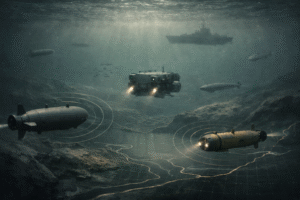Militarization of Arctic: A Need for Regulations for Military Activities

Once considered the region of cooperation, the Arctic has evolved into a new arena of strategic competition among major powers. The region is facing the severe consequences of climate change that results in melting of icecaps at an unprecedented rate and in the creation of new sea routes. Those new sea routes are filled with untapped natural resources including petrochemicals, minerals, and fish stocks. The huge economic imperative of these new routes has caught the attention of global powers including the United States, Russia, and China. The superpowers are militarizing the region to take control of these resources. This increased militarization not only negatively impacts the stability of the Far North but can potentially convert it into a volatile region. Therefore, there is a need for global consensus to regulate military activities in the Far North through an international treaty or arrangement.
To strengthen its position over the Arctic, the United States has declared a new strategy titled “Regaining Arctic Dominance.” It states that the American army will generate, train, organize and equip its forces to partner with Arctic allies and secure its national interests and will maintain regional stability. Additionally, it reinstates the Arctic’s status as a platform for global power projection. Along with the USA, its allies including Norway and Canada also came up with similar strategies. The Canadian government seeks to enhance its military presence in the Arctic, as it is a critical region for the national security and Canada will exercise full sovereignty in the Far North. Similar statement came from Norway that the Navy will get four new submarines, the air defense system will be made more stronger and the army will also get Long-Range precision weapons. Overall, €1.46 billion (Norwegian kroner) will be added to the armed forces from a total of 16.5 billion Norwegian Kroner. Simultaneously, the North Atlantic Treaty Organization (NATO) has also doubled its military presence in this region which emphasize the Arctic’s importance in contemporary times.
Now Russia is also using its military might to secure its strategic objectives in this region. Among several other steps, it has reopened its strategic military bases in the region. This base dates back to the Cold War time. The Northern Fleet of the Russian military is once again in action and is comprised of a diverse array of military assets, including nuclear submarines, independent combined units, the Air Force and Air Defense Force, a Ground Forces Army Corps, Coastal Defense Units, and various types of surface ships from different classes and almost 81% of Russia’s nuclear weaponry. Moscow also regularly conducts military exercises in this region to exercise its power and to conduct extensive research.
Recently, China has also started taking interest in the region and it has labelled itself as a “near arctic state.” This claim is solidified by the joint military exercises of China and Russia. For instance, Chinese and Russian warships do combine exercises and it was encountered by the US coast guard on September 26, 2022. Scholars have argued that these joint military exercises of in the Arctic underscores the importance of this region and marked a shift in the security dynamic of the far North. Even though China is not a littoral state, it sees Arctic as a heritage of mankind. In 2009, Hu Zhengyue, China’s Assistant Minister of Foreign Affairs, delivered a speech at an Arctic forum held in Norway’s Svalbard Archipelago. During his address, Hu referred to the Arctic as a shared global heritage for all of humanity. This argument showcases China’s interest in employing every means to achieve its share in the newfound resources of the Arctic. Additionally, this argument manifests in the written strategies of the Chinese military namely “The Science of Military Strategy”, a textbook released by China’s National Defense University (NDU) in 2020. The book asserts that the Arctic region is “a key area where China’s national interests are expanding” and emphasizes that this region will inevitably present new tasks for the Chinese military forces. Thus, China being a rising nation will continue to employ its military power in this region to achieve its strategic objectives.
Considering the above-mentioned military activities of Washington, Moscow and Beijing, there is a dire need for regulating military activities in the Arctic region. The treaty would declare some zones ‘demilitarized’ where military activities could be prohibited. Furthermore, there must be a specific limit for the deployment of nuclear weapons and their delivery means in the Arctic region. Particularly, the nuclear weapon possessor Arctic members need to work on that. Lastly, under this treaty, regular dialogues should take place between Arctic and non-arctic nations. And forums like Artic Council could be substantial in hosting dialogues and negotiations for regulations of military activities in the region.
In a nutshell, the creation of new sea routes in the Arctic is presenting a challenge to the overall stability of the Far North, with great powers eyeing the untapped natural resources and employing military means to achieve their objectives. There exists a need for a global treaty that should call for limited military deployment and eventual demilitarization of the Arctic zones to establish a non-zero-sum game in the region. Without a global treaty, the region could turn into a potential flashpoint for conflict which will have far-reaching consequences for the whole world.



